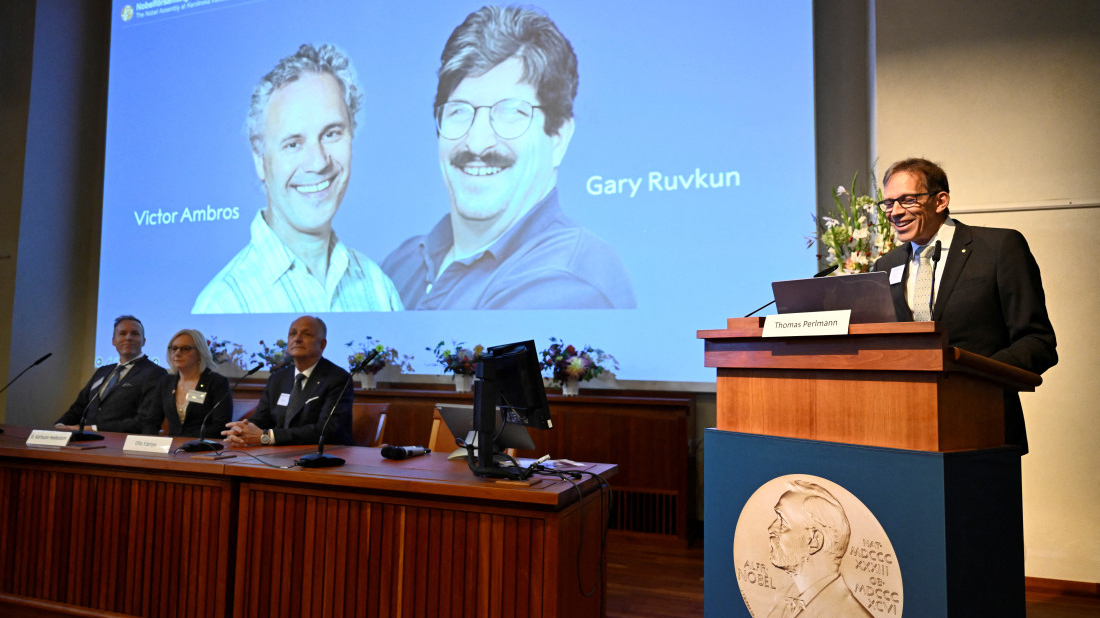live Qatar shoots down Iranian jets: All the latest news on the Iran strikes
The Middle East crisis intensifies after the deadly attack on the compound of the Supreme Leader of Iran Ali Khamenei on Saturday t...

The Nobel Prize in Physiology or Medicine was awarded today to Victor Ambros and Gary Ruvkun for their pivotal discovery of microRNA—tiny genetic elements that regulate gene activity at the cellular level
The Nobel Prize in Physiology or Medicine has been awarded to scientists Victor Ambros and Gary Ruvkun for their groundbreaking discovery of microRNA, tiny genetic elements that regulate gene activity at the cellular level. This pivotal finding holds significant promise for developing innovative cancer therapies.
The announcement, made on Monday, marks the start of the 2024 Nobel Prize season, which celebrates extraordinary achievements across science, economics, literature, and peace. The Nobel Assembly at the Karolinska Institute described the discovery as "fundamentally important" for understanding how organisms develop and function. The Medicine or Physiology prize is the first in a series of Nobel announcements, running from October 7 to 14.
Ambros and Ruvkun first published their findings in 1993, unveiling a new layer of gene regulation that has since proven crucial and evolutionarily conserved. Dr. Claire Fletcher, a molecular oncology expert at Imperial College London, praised the discovery, stating that microRNA has transformed the way scientists approach treating diseases such as cancer by enabling precise regulation of gene function at the cellular level.
Each Nobel Prize comes with an award of 11 million Swedish crowns (approximately $1.1 million), which can be shared by up to three recipients. The next Nobel announcement, for Physics, is set for Tuesday, followed by Chemistry on Wednesday, Literature on Thursday, and the Nobel Peace Prize on Friday.
Follow the latest developments and global reaction after the U.S. and Israel launched “major combat operations” in Iran, prompting retaliation from Tehran.
Saudi Arabia’s state oil giant Saudi Aramco closed its Ras Tanura refinery on Monday following an Iranian drone strike, an industry source told Reuters as Tehran retaliated across the Gulf after a U.S.-Israeli attack on Iranian targets over the weekend.
The Kremlin is utilising the recent United States and Israeli military strikes on Iran to validate its ongoing war in Ukraine. Russian officials are pointing to the escalation in the Middle East as evidence that Western nations do not adhere to international rules.
The Middle East crisis intensifies after the deadly attack on the compound of the Supreme Leader of Iran Ali Khamenei on Saturday that killed him, other family members and senior figures. Iran has launched retaliatory strikes on U.S. targets in the region.
Ayatollah Alireza Arafi has moved into a pivotal constitutional role following the death of Supreme Leader Ayatollah Ali Khamenei, becoming the clerical member of Iran’s temporary leadership council under Article 111 of the Constitution of the Islamic Republic of Iran.
Measles cases across Europe and Central Asia fell sharply in 2025 compared to the previous year but health officials have warned that the risk of fresh outbreaks remains unless vaccination gaps are urgently addressed.
A Florida university has become a new hotspot in a widening U.S. measles outbreak, with health officials confirming multiple infections and hospitalisations.
The World Health Organization has added the Nipah virus to its list of the world’s top 10 priority diseases, alongside COVID-19 and the Zika virus, warning that its epidemic potential highlights the global risk posed by fast-spreading outbreaks.
Belgian authorities are examining suspected cases of infants falling ill after consuming recalled Nestle baby formula, amid warnings that confirmed infections may be underestimated due to limited testing requirements.
Two Nipah infections involving health workers in India have triggered heightened screening across Southeast Asia as authorities move to prevent the high fatality virus from spreading beyond the country.
You can download the AnewZ application from Play Store and the App Store.

What is your opinion on this topic?
Leave the first comment